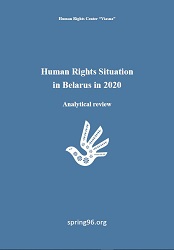
We kindly inform you that, as long as the subject affiliation of our 300.000+ articles is in progress, you might get unsufficient or no results on your third level or second level search. In this case, please broaden your search criteria.

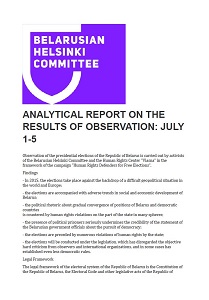
Observation of the presidential elections of the Republic of Belarus is carried out by activists of the Belarusian Helsinki Committee and the Human Rights Center "Viasna" in the framework of the campaign "Human Rights Defenders for Free Elections".
More...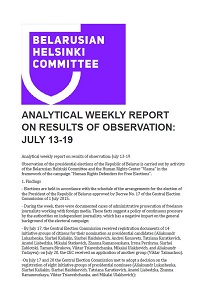
Observation of the presidential elections of the Republic of Belarus is carried out by activists of the Belarusian Helsinki Committee and the Human Rights Center "Viasna" in the framework of the campaign "Human Rights Defenders for Free Elections".
More...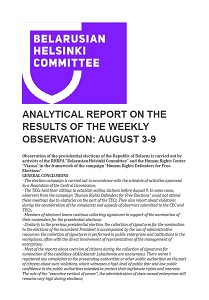
Observation of the presidential elections of the Republic of Belarus is carried out by activists of the RHRPA "Belarusian Helsinki Committee" and the Human Rights Center "Viasna" in the framework of the campaign "Human Rights Defenders for Free Elections".
More...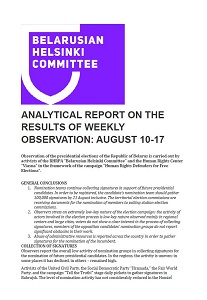
Observation of the presidential elections of the Republic of Belarus is carried out by activists of the RHRPA "Belarusian Helsinki Committee" and the Human Rights Center "Viasna" in the framework of the campaign "Human Rights Defenders for Free Elections".
More...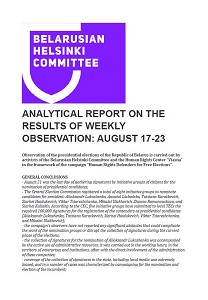
Observation of the presidential elections of the Republic of Belarus is carried out by activists of the RHRPA "Belarusian Helsinki Committee" and the Human Rights Center "Viasna" in the framework of the campaign "Human Rights Defenders for Free Elections".
More...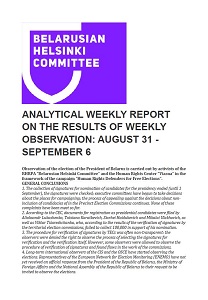
Observation of the election of the President of Belarus is carried out by activists of the RHRPA "Belarusian Helsinki Committee" and the Human Rights Center "Viasna" in the framework of the campaign "Human Rights Defenders for Free Elections".
More...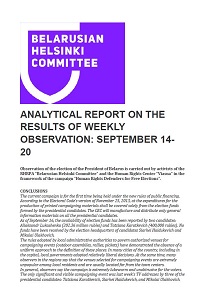
Observation of the election of the President of Belarus is carried out by activists of the RHRPA "Belarusian Helsinki Committee" and the Human Rights Center "Viasna" in the framework of the campaign "Human Rights Defenders for Free Elections".
More...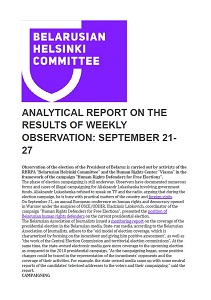
Observation of the election of the President of Belarus is carried out by activists of the RHRPA "Belarusian Helsinki Committee" and the Human Rights Center "Viasna" in the framework of the campaign "Human Rights Defenders for Free Elections".
More...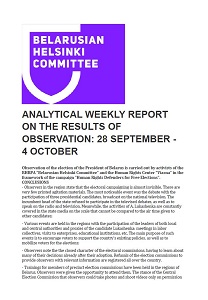
Observation of the election of the President of Belarus is carried out by activists of the RHRPA "Belarusian Helsinki Committee" and the Human Rights Center "Viasna" in the framework of the campaign "Human Rights Defenders for Free Elections".
More...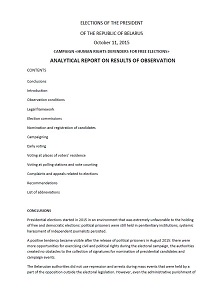
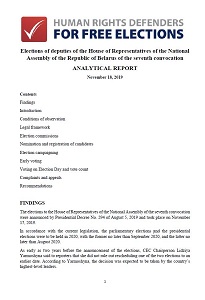
ANALYTICAL REPORT November 18, 2019 by »Human Rights Defenders for Free Elections«
More...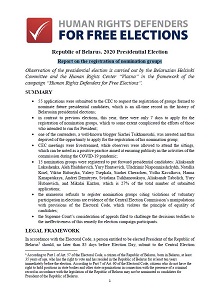
Observation of the presidential election is carried out by the Belarusian Helsinki Committee and the Human Rights Center “Viasna” in the framework of the campaign “Human Rights Defenders for Free Elections”.
More...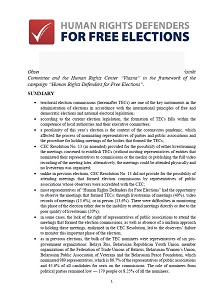
Observation of the presidential election is carried out by the Belarusian Helsinki Committee and the Human Rights Center “Viasna” in the framework of the campaign “Human Rights Defenders for Free Elections”.
More...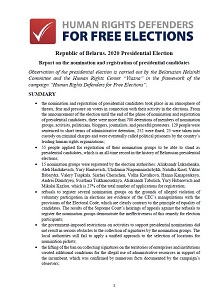
Observation of the presidential election is carried out by the Belarusian Helsinki Committee and the Human Rights Center “Viasna” in the framework of the campaign “Human Rights Defenders for Free Elections”.
More...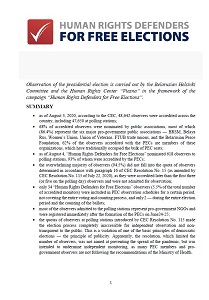
Observation of the presidential election is carried out by the Belarusian Helsinki Committee and the Human Rights Center “Viasna” in the framework of the campaign “Human Rights Defenders for Free Elections”.
More...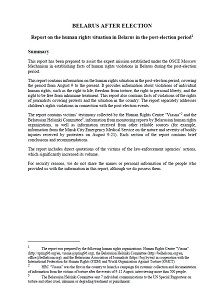
This report has been prepared to assist the expert mission established under the OSCE Moscow Mechanism in establishing facts of human rights violations in Belarus during the post-election period. The report contains information on the human rights situation in the post-election period, covering the period from August 9 to the present. It provides information about violations of individual human rights, such as the right to life, freedom from torture, the right to personal liberty, and the right to be free from inhumane treatment. This report also contains facts of violations of the rights of journalists covering protests and the situation in the country. The report separately addresses children's rights violations in connection with the post-election events. The report contains victims’ testimony collected by the Human Rights Centre “Viasna” and the Belarusian Helsinki Committee, information from monitoring reports by Belarusian human rights organizations, as well as information received from other reliable sources (for example, information from the Minsk City Emergency Medical Service on the nature and severity of bodily injuries received by protesters on August 9-21). Each section of the report contains brief conclusions and recommendations. The report includes direct quotations of the victims of the law-enforcement agencies’ actions, which significantly increased its volume. For security reasons, we do not share the names or personal information of the people who provided us with the information in this report, although we do possess them.
More...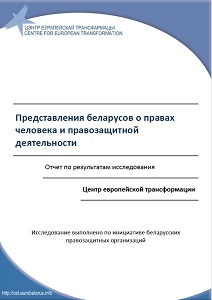
In accordance with the terms of reference, the purpose of the study was to reveal the ideas that exist in Belarusian society about the relationship between a person and the state, human rights and human rights activities. As a research method, the method of focus group interviews was chosen, which allows to reveal not only people's points of view and opinions, but also the basis on which they are built. The main hypothesis was that the views and attitudes of Belarusians on issues of interest to us differ depending on the relationship of their social group to the state system. Based on this, four social groups were selected from which participants were recruited for conducting focus groups.
More...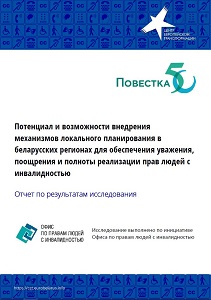
The analysis of the sector of civil society youth organizations, including the role and influence of their environment, is one of the sectoral analyses that the Office for European Expertise and Communications (OEEC) has been conducting since 2012. The aim of this analysis is to summarize the existing expert and scientific data regarding the development of specific sectors of the Belarusian civil society, and complement it with quantitative and qualitative studies of the aspects, which have not been studied so far.On September 24, 2015, the Republic of Belarus joined the UN Convention on the Rights of Persons with Disabilities, a year later, on October 3, 2016, it was ratified. The Convention is aimed at promoting, protecting and ensuring the full and equal exercise of all human rights and fundamental freedoms by all persons with disabilities, as well as promoting respect for their inherent dignity. Comprehensive implementation of the Convention is connected with bringing the Belarusian legislation into compliance with the provisions of this international treaty and, what is no less important, with the introduction of relevant changes in the Belarusian law enforcement practice. The experience gained by the countries of Europe during the implementation of the Standard Rules for Equal Opportunities2 proved the necessity of applying efforts to implement innovations, starting precisely from the level of local communities. But these processes are associated with a number of difficulties arising both at the national level and at the level of specific regions, which are to varying degrees ready to implement the provisions of the Convention.
More...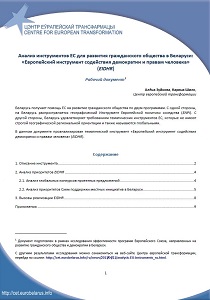
The "European Instrument for the Promotion of Democracy and Human Rights" (hereinafter - EIDHR) was created in 2007 and replaced the "European Initiative for the Promotion of Democracy and Human Rights"2. The instrument was created to promote the development and consolidation of democracy and the rule of law, respect for all human rights and freedoms. EIDHR is consistent with the EU's foreign policy as a whole, acting within the framework of the EU's development policy and economic, financial, technical cooperation with third countries. The EIDHR strategy is based on working with and for civil society organizations and is aimed at protecting fundamental freedoms, it also promotes civil society to become an effective force for political reforms and protection of human rights. Thus, this program will complement geographic tools that promote democracy and human rights, primarily through cooperation with the government.
More...